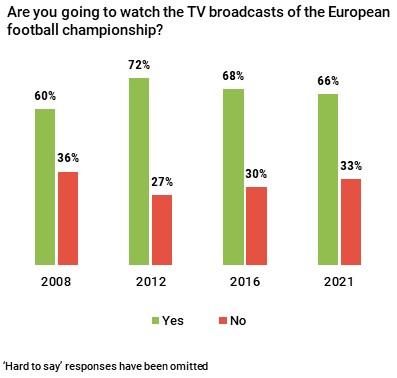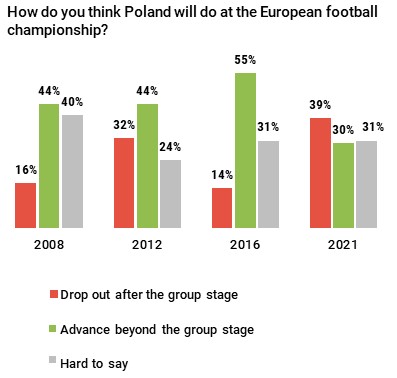22/2021
2021-06-29
EURO 2020
On 11 June, after a year’s delay caused by the Covid-19 pandemic, the men's football championship of Europe (EURO 2020) organised by the Union of European Football Associations (UEFA) began. In a survey that started before the start of the tournament and continued into the first week of play, Polish people were asked about their interest in TV broadcasts of EURO 2020 and their rating of the Polish team’s chances.
Two thirds of Polish adults (66%) said they would watch the TV broadcasts of the football championship. Interest in EURO 2020 is marginally lower than during the previous edition of this championship, and quite clearly lower than EURO 2012, when the matches were played in Poland and Ukraine. Even so, more people intend to watch the broadcasts than in 2008, when the Polish team took part for the first time.

|
Losing the first match to the weakest, at least theoretically, opponent in the group, most probably had an effect on the expectations of the Poland fans. Close to two fifths of the people surveyed (39%) think that Poland will drop out of the championship after the group stage and only 30% of those asked expect the team to advance. This means that expectations of the Poland team’s performance at the European football championship are the least optimistic since Poland began taking part.

|
More on this subject in the CBOS report.
This ‘Current Events and Problems’ survey (373) was conducted using a mixed-mode procedure on a representative sample of named adult residents of Poland, randomly selected from the National Identity Number (PESEL) register.
Respondents independently selected one of the following methods:
– Computer Assisted Personal Interview (CAPI);
– Computer Assisted Telephone Interview (CATI), respondents receiving researchers’ telephone numbers in an introductory letter from CBOS;
– Computer Assisted Web Interview (CAWI), where respondents filled in the online questionnaire independently, gaining access by means of a login and password provided in an introductory letter from CBOS.
– Computer Assisted Personal Interview (CAPI);
– Computer Assisted Telephone Interview (CATI), respondents receiving researchers’ telephone numbers in an introductory letter from CBOS;
– Computer Assisted Web Interview (CAWI), where respondents filled in the online questionnaire independently, gaining access by means of a login and password provided in an introductory letter from CBOS.
In all three cases the questionnaire had the same structure and comprised the same questions. The survey was carried out between 7 – 17 June 2021 inclusive on a sample of 1218 people (60.8% using the CAPI method, 26.7% CATI and 12.6% CAWI).
CBOS has been conducting statutory research using the above procedure since May 2020, stating in each case the percentage of personal, telephone and internet interviews.





